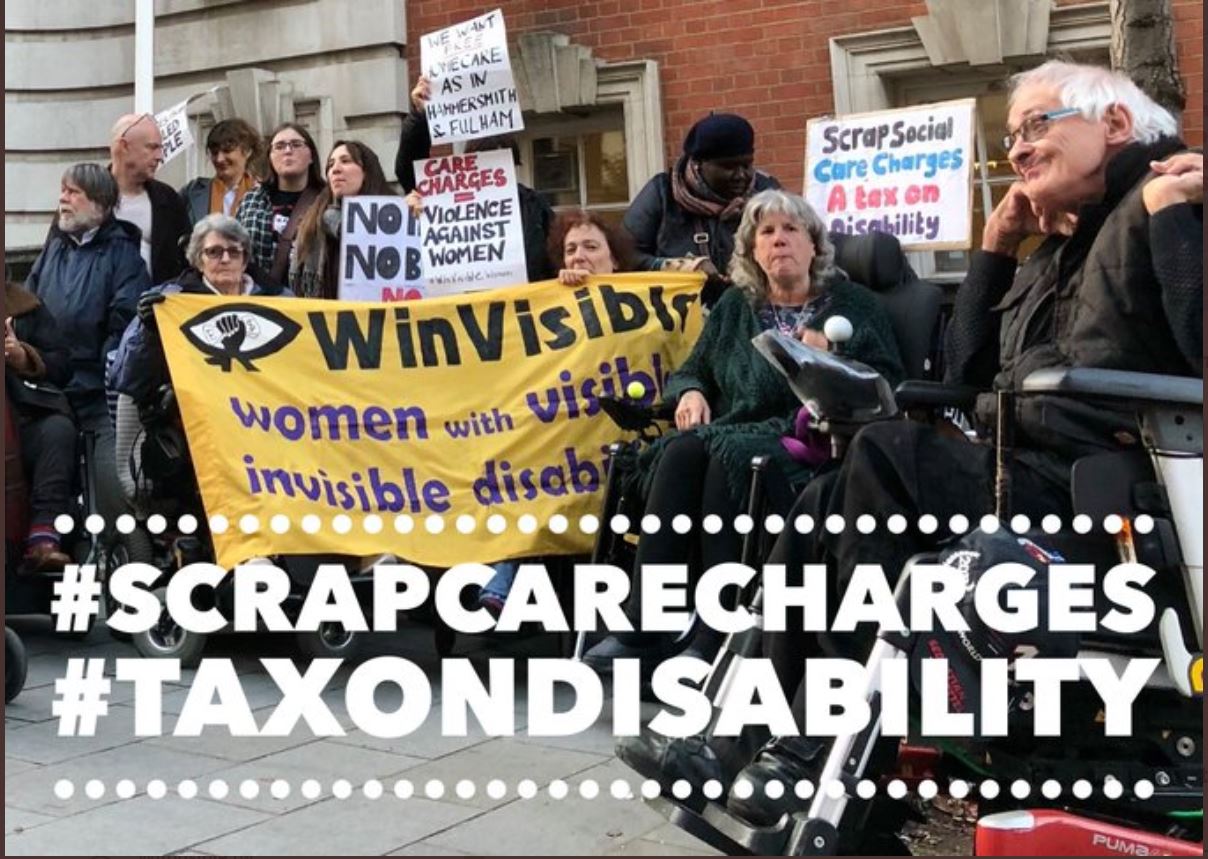
We’re alarmed as today on the news it was reported that before Coronavirus, the government was in discussions to revive the Dilnot Commission “lifetime cap on charges” for social care. Which is accompanied by higher taxation of people individually to fund social care. This is not the answer to the social care crisis.
WinVisible and Hammersmith & Fulham Coalition Against Cuts (HAFCAC) opposed the lifetime cap on charges as this accepts that disabled and older people are obliged to pay individually for care and support needs. Severely disabled people pay more for higher support needs, so it is doubly discriminatory.
The £35,000 cap on residential-home care charges does nothing to help disabled and older people impoverished by homecare charges in our own homes, taken from our disability benefits.
The lifetime cap promise is misleading because the cap only applies to care charges. Much of the weekly fees for a residential home are for accommodation, heating, food, laundry and cleaning costs. As these are not strictly for hands-on care, they would not be counted towards your total care costs. So most people, once sick enough to be placed in residential homes, don’t survive for enough years to benefit from such a cap. Before Coronavirus, in one research study, only a third of care home residents survived for more than three years.
Prof Luke Clements, who is a legal authority on community care, previously calculated that it would take 3.5 years to reach the cap, by which time the person would have paid out over £150,000 for their accommodation. And even when they had reached the cap they would continue to have to pay £230 a week for accommodation (and lose their PIP / DLA to boot — this benefit stops after 28 days). See here for more about the pitfalls of the cap.
What we need now under Coronavirus is suspension of all care charges made by local Councils. Disabled people are faced with extra costs for food, PPE, cabs and lots of other expenses.
We said before:
“What some Conservatives have suggested on social care is even worse than now:
- A class-biased two-tier system, whereby low-income people continue to get poor-quality care, while those who can pay, or can buy private insurance, get better care (Damian Green).
- Increased personal taxation to pay for later care (Jeremy Hunt).
In England, the charging systems for residential care homes, and homecare — support at home — are different. And Scotland has a different system with free personal care for pensioners.
Residential care homes:
If you have savings or “capital” below £14,250, you don’t have to pay anything.
If your savings are between £14,250 and £23,250, then the local Council will pay some and you are asked for a part contribution.
If your savings or capital is more than £23,250, then you pay the full cost of the residential home, until your savings go below the threshold.
But with homecare:
Disabled and older people with no savings can be charged immediately from our disability benefits. As soon as the service starts, and before any assessment of what we can actually afford. Councils say they have to charge more to comply with the Care Act. But Councils are not obliged to charge, it is at their discretion. These charges, and increases permitted by the Care Act, are what we are fighting now.
Hammersmith & Fulham Council is the only Council in England which has made a principled policy decision not to charge disabled and older people for homecare, following years of campaigning by local disabled and older people.
Many people supported the Care Act becoming law, and accepted the charging system it expanded, because they were promised that the Care Act brought in a “lifetime cap on charges” limiting how much people would be charged for residential homes, so people would not have to sell their house. As we warned at the time, it has brought in higher charges.
The lifetime cap does not help people being charged for support at home from our disability benefits, and who are not home-owners.
And to cap it all, the lifetime cap on charges was never implemented. It was viewed as too expensive as it would cost £6 billion over 5 years. Compared with the notorious HS2 trainline, where demolitions have blighted communities in Camden and beyond, and ancient woodland and wildlife are being destroyed forever, which is expected to cost up to £106 billion.”
Read more here.
